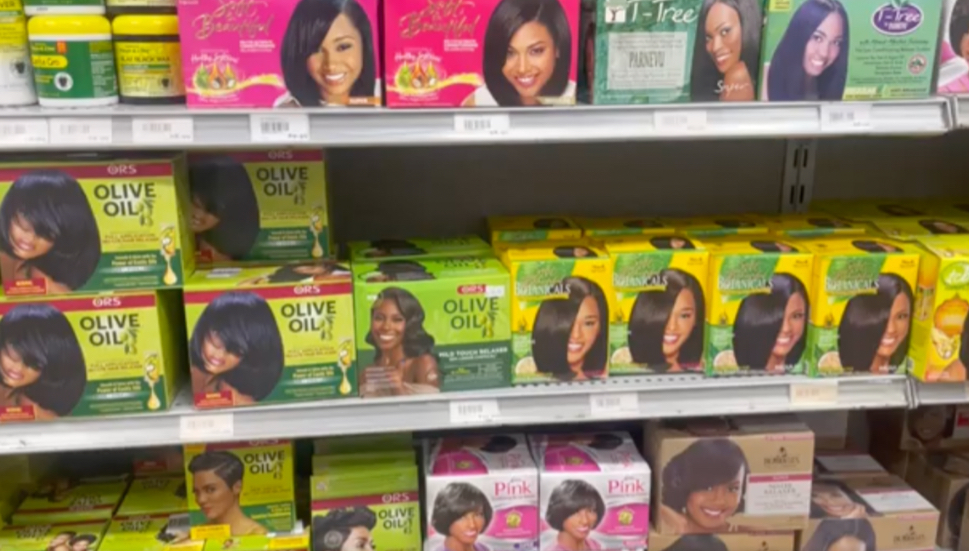
Women using relaxers were twice as likely to develop uterine cancer compared to non-users, according to a study by the National Institute of Environmental Health Sciences. (Photo: Aniya Greene/HUNewsService.com)
By Aniya Greene
Kianni McCain was 7 years old when her mother started relaxing her hair.
Her mother would apply the mixture to the roots of her hair every three months. McCain said that relaxers made her hair easier for her single mother to manage.
The 22-year-old, who no longer relaxes her natural hair, said she is pleased that the Food and Drug Administration (FDA) intends to ban the use of formaldehyde, a key ingredient in hair straightening agents.
“As Black women, we’ve been using these products for so long despite the number of health risks. So I’m glad to see that the FDA’s finally taking this step,” McCain said.
The proposed rule was initially scheduled to go into effect this month, but has been postponed to July 2024. The proposal comes after extensive research proving the chemical’s connection to cancer and other health-related issues.
A study by the National Institute of Environmental Health Sciences found that women using relaxers were twice as likely to develop uterine cancer compared to non-users.

Chemicals in relaxers disrupt estrogen levels, says Dr. Onyinye D. Balogun, a radiation oncologist. (Photo: New York-Presbyterian Brooklyn Methodist Hospital)
“These chemicals are associated with breast and ovarian cancers because they disrupt the estrogen levels in the body, and that could be the way in which they may be leading to higher rates of endometrial (uterine) cancer,” Dr. Onyinye D. Balogun, a radiation oncologist at NewY ork-Presbyterian Brooklyn Methodist Hospital, said the hospital’s Health Matters newsletter.
Researchers at the National Institute of Health found that among 1,555 Black women, 89% reported ever using relaxers.
The FDA is reviewing data linking formaldehyde to increased cancer risks and is developing a proposed rule to ban the chemical.
“A proposed rule that would ban use of formaldehyde and other formaldehyde-releasing chemicals in hair straightening products, if finalized, would help protect public health by reducing the risk of exposure to this harmful substance,” said Courtney Rhodes, an FDA spokesperson, in an email statement.
“I remember my scalp used to burn so badly when my mom gave me relaxers,” McCain said. “So knowing that it has links to diseases like cancer isn’t surprising.”
Weena Jerome, owner of Renaissance Curls, a natural hair salon in New York City, said the ban is essential.
“This ban is important because there’s been so much research about relaxers and the amount of damage they cause to Black women and their natural hair,” she said.
For some Black women, like McCain and her mother, relaxers are viewed as the solution to managing their natural hair.
“A lot of people view natural hair as high maintenance, which is, I think, why so many Black women like my mom resort to relaxers,” she said.
As a natural hair specialist, Jerome is looking to change this perception.
“We haven’t been taught how to take care of our hair,” she said. “So that’s why in our salon, we take the time to show them that natural hair doesn’t have to be complicated. We make sure to infuse education in our services.”
Although the proposal has been entered into the Unified Agenda, Rhodes says the timing of a ruling on the harsh chemical is still unpredictable.“We can never predict the exact timing. Even July is an estimate,” she said.
Rhodes recommends that the public continue to monitor the Unified Agenda to stay updated on the progress of the proposed ruling.
Aniya Greene is a reporter for HUNewsService.com.

UPDATE ON RELAXERS: Linda Villarosa goes to the root of the harm of hair relaxers in a yearlong project for The New York Times Magazine. Click here to learn more. (Photo: Naila Ruechel for The New York Times)







